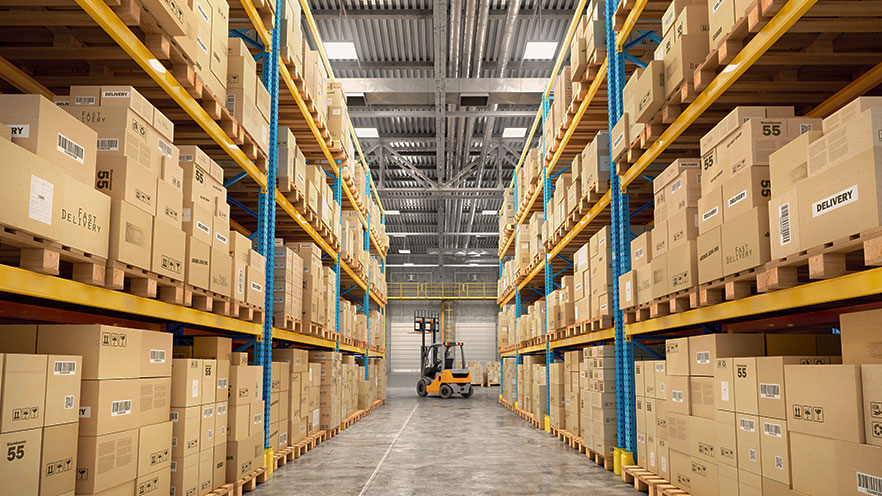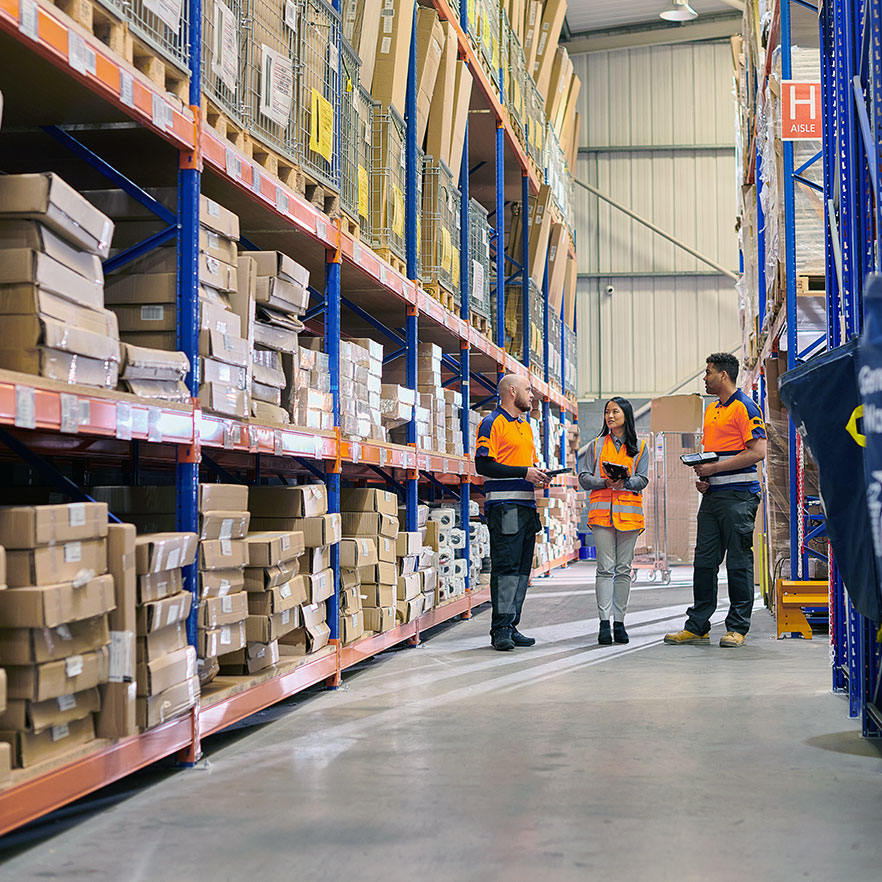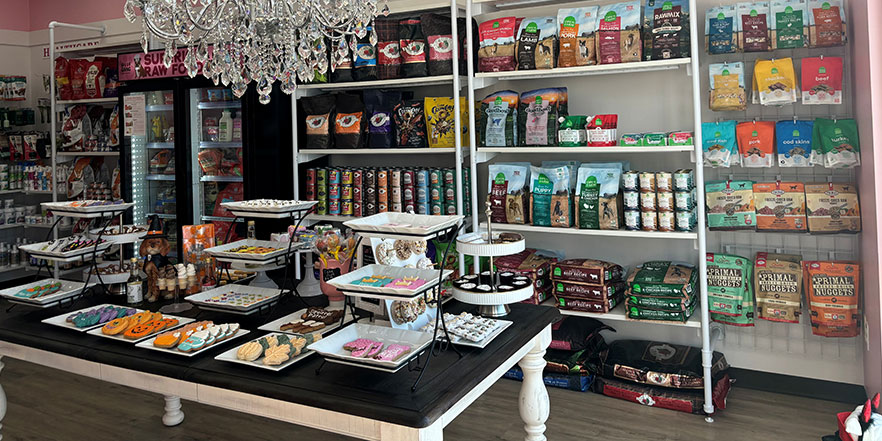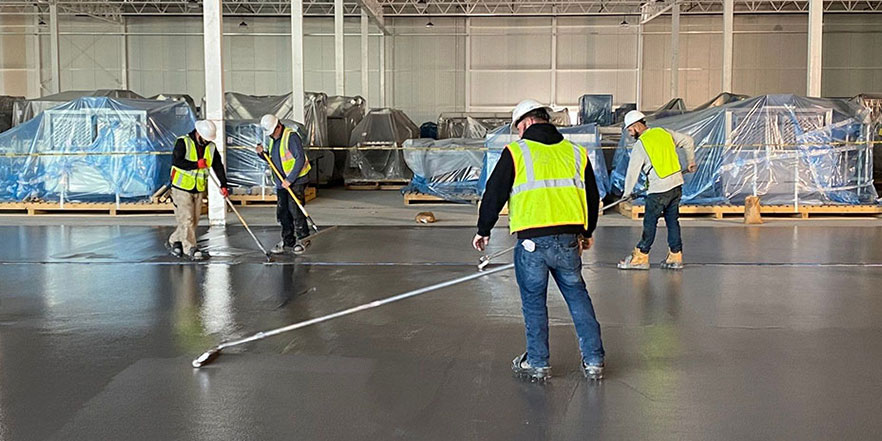Industry
Warehouse Loans
Use an SBA loan to expand your warehouse business
Home » Other Industries »
See If You Pre-Qualify for an SBA Warehouse Loan in 3 Minutes
Get the capital you need to fund your business

Fill in your info:

Top 5 SBA franchise loan lender*
+$600 million franchise loans funded
+$2 billion in SBA loans since 2020
+2,000 SBA loans funded since 2020
High demand leaves small businesses competing for warehouse space
Small businesses looking to purchase a warehouse face a unique set of financial challenges. According to the National Association of Realtors, the median price for commercial real estate has surged by nearly 30% over the past five years. Warehouses have become hot properties, with demand skyrocketing thanks to the growth in e-commerce and logistics. This means businesses looking to expand their storage or distribution capabilities are often met with hefty price tags, pushing financing needs to new heights.
Acquiring a warehouse isn’t just about the purchase price. There are a lot of hidden costs that small businesses need to account for. Think property taxes, maintenance, insurance, and potential renovations. These costs add up quickly, and for small businesses operating on thin margins, coming up with the cash for a down payment or covering these ongoing expenses can feel overwhelming. Add in that shifts in the economy will see rates rise and fall, impacting the affordability of loans.

Long-term financing options can open doors for warehouse purchases
When a business is looking to buy a warehouse, the Small Business Administration (SBA) can offer critical support. The two most popular loan programs, the 7a loan and the 504 loan, are particularly effective for business owners facing high upfront costs. The 7a loan program, for example, provides up to $5 million in funding, allowing small businesses to secure real estate with down payments as low as 10%. This program also offers repayment terms of up to 25 years for commercial real estate, helping businesses manage their cash flow more efficiently.
The 504 loan is another powerful option, specifically aimed at financing fixed assets like warehouses. With a 504 loan, businesses can receive up to $5 million for purchasing or improving commercial properties. One of its main benefits is the fixed interest rate, which provides stability and protection against market fluctuations. This structure enables small businesses to plan better, focusing on growth rather than worrying about fluctuating loan costs.
At First Bank of the Lake, we have extensive experience assisting businesses with their commercial real estate purchases. With our personal approach and deep knowledge of SBA lending, we’ve successfully funded over $1.1 billion in loans to small businesses. If you’re planning to buy a warehouse and need expert guidance, we’re here to help. Let’s make your expansion a reality together.
Learn more about warehouse loans
How to Get a Warehouse Loan for Your Business
Read Time: 5 minutes
Summary: Securing a warehouse loan is essential for warehouse businesses that want to service the high growth of fast shipping and overnight ecommerce. Whether you’re buying, building, or upgrading a warehouse, SBA 7a and 504 loans offer flexible financing with low down payments, favorable rates, and long terms that make ownership attainable. By preparing a solid business plan and partnering with an SBA-approved lender, businesses can secure funding to support growth and gain a strategic edge in their industry.
As e-commerce grows rapidly and supply chains expand, the demand for industrial and warehouse space is surging. For today’s business owners, having access to a dedicated warehouse isn’t just a luxury, it’s a strategic move to manage inventory, keep distribution efficient, and control costs. Owning your warehouse can give your business a real advantage but purchasing or upgrading such a major asset takes significant capital. That’s where a warehouse loan comes in. It’s designed to help businesses buy, build, renovate, or refinance the space they need to keep growing.
If you’re new to commercial real estate financing, the options and requirements can seem daunting. However, understanding what’s available is the first step toward making an informed decision and ensuring a smoother experience throughout the process. We will look at the options for warehouse loans, with a focus on advantageous programs from the Small Business Administration (SBA), including the popular SBA 7a and SBA 504 loans. You’ll also learn how to prepare for the application process and leverage these loans to best support your business objectives.
Understanding the Basics of a Warehouse Business Loan
A warehouse loan is a type of commercial real estate financing that serves businesses looking to buy, build or renovate a warehouse property. These loans differ significantly from residential mortgages in that they’re assessed based on the financial health of your company, the income potential of the property, and your own credit as the owner.
The ways you can use these specialized loans for warehouses are extensive. Whether your goal is to buy an existing facility, work on the construction of a new custom warehouse, expand or update your current space, these loans can be tailored to meet your needs. Because warehouses are valuable commercial assets, lenders are usually willing to extend substantial amounts of credit, assuming you can clear their often-tougher vetting process, which typically involves supplying business plans, financial statements, future projections, and professional appraisals.
Financing Options: From Conventional to SBA-Backed Solutions
There are two broad methods for obtaining a warehouse loan: traditional lending through banks and private institutions, or government-supported loans primarily administered in partnership with the SBA. The right choice depends on your financial profile, business goals, and how quickly you need access to funding.
Conventional bank loans are attractive to established businesses that have solid credit, long records of profitability, and significant cash reserves for down payments and collateral. Banks and credit unions offer these loans without government guarantees, which means their qualification criteria are typically strict. Down payments or equity injections of 10-20% are typical, and you’ll need to provide evidence of excellent personal and business credit histories, as well as collateral. The rates on conventional loans are highly competitive for qualified applicants, but for firms just starting out or those with less capital, the requirements can be a considerable hurdle.
This is where SBA programs become invaluable. The U.S. Small Business Administration works with banks to reduce their lending risk. Through loan guarantees, the SBA opens doors for small and medium-sized business owners who might not meet the criteria of conventional loan providers. SBA-backed warehouse loans offer more generous terms, lower down payments, and greater flexibility, especially through their 7a and 504 loan programs, both of which have become favored options for acquiring or expanding warehouse space.
SBA 7a Loans: Flexible Financing for Warehouses
The SBA 7a loan program is renowned for its versatility and accessibility. It’s the SBA’s flagship option for general small business financing and is fully applicable to warehouse projects. What makes a 7a loan especially attractive is the broad range of uses for the borrowed capital. You can apply the funds to the purchase of a warehouse, to construction or renovation, to refinancing other real estate debt, or even to equipment, staffing, and general working capital needs.
With maximum loan amounts up to $5 million, an SBA 7a warehouse loan allows businesses to stretch their investment dollars further. One of its greatest strengths is the relatively modest down payment, often as low as 10%. This lower cash requirement is especially helpful for growing companies who need to conserve resources for other operational expenses. Repayment terms can reach up to 25 years when real estate is involved, spreading out your payments and lowering the monthly burden, while ten-year terms apply to working capital and equipment.
Interest rates are variable, tied to the Prime Rate, and capped by the SBA to keep them borrower-friendly. Ultimately, the 7a program is well-suited to businesses that want maximum flexibility. For example, maybe you’re looking to buy a warehouse, but you also plan to hire new staff, stock inventory, or upgrade your technology. An SBA 7a warehouse loan offers the flexibility to cover all of that and more. Its broad use of funds makes it a popular choice for small and mid-sized businesses that want one loan to support their full growth plan.
Use our SBA 7a loan calculator to estimate warehouse loan and interest payments. Learn more about buying a warehouse business with our ePub: Understanding How to Buy a Business.
SBA 504 Loans: Powering Major Warehouse Projects
For companies focused primarily on the acquisition, construction, or significant upgrading of real estate or large equipment, the SBA 504 loan is another top choice. The 504 program is tailored to supporting large long-term investments in commercial real estate or fixed assets and is especially popular for warehouse acquisitions.
Unlike the more general 7a loan, the SBA 504 loan has a unique structure designed for real estate and large fixed-asset projects. Three parties share in the financing: a bank or private lender covers a minimum of 50% of the project cost, a Certified Development Company (CDC) a nonprofit certified by the SBA, provides up to 40% through a fixed-rate loan, and you, the borrower, contribute a minimum of 10% as a down payment. For startups or specialized properties, that down payment may increase to 15% or 20%.
The CDC portion of a 504 SBA warehouse loan can reach $5 million, or even $5.5 million for projects that meet certain energy efficiency or manufacturing criteria. There’s no absolute ceiling on the total project size, giving borrowers flexibility for larger undertakings. SBA 504 loans are intended strictly for large fixed assets, such as acquiring land or existing warehouse buildings, constructing new facilities, or purchasing major equipment with a long useful life. They cannot be used for soft costs like working capital or inventory.
One of the greatest advantages of the SBA 504 is stability. The CDC’s financing comes with a low, fixed interest rate for terms of ten, twenty, or twenty-five years, which shields your business from market fluctuations. This fixed-rate predictability, combined with favorable repayment schedules, makes the 504 warehouse loan especially effective for businesses that want to lock in expenses and build long-range plans.
Use our SBA 504 loan calculator to estimate warehouse loan payments. Learn a lot more from our in depth guides on 504 Loans and 504 Loan ePub.
The Process of Applying for a SBA Warehouse Loan
Preparation is the cornerstone of a successful SBA loan application. Begin by deciding exactly what you wish to achieve, perhaps you’re buying an existing facility, building from scratch, or expanding and renovating current warehouse operations. Carefully document the total capital you’ll need, including purchase prices, renovation and construction costs, equipment, and all related fees. Clarity at this stage ensures you approach the right SBA loan program and request an appropriate funding amount.
Next, you’ll need to prepare a detailed business plan. The SBA and its affiliated lenders require robust documentation, including a company overview, market analysis, comprehensive operational blueprint, and detailed financial projections extending at least three years into the future. This plan demonstrates to lenders not just your vision, but your capacity to repay.
The paperwork phase matters greatly to both 7a and 504 warehouse loans. Expect to supply three years of both personal and business tax returns, up-to-date financial statements, a listing of all current debts, legal certificates (such as incorporation documents or licenses), and, if you’ve already identified a property, the purchase agreement. These requirements help lenders assess your risk and your business’s potential for growth.
With your documents in order, seek an SBA-approved lender, like First Bank of the Lake as they are part of the SBA’s Preferred Lenders Program. This streamlines credit decisions and can noticeably speed up processing. Once you’re working with your lender, respond to all information requests promptly and completely. A well-organized and thorough application packet improves your credibility and helps you move efficiently toward approval.
Warehouse Loans – Frequently Asked Questions (FAQ)
1. How much can I borrow with warehouse loans?
Loan amounts depend on the lender, loan program, and your business financials. Conventional lenders set their own internal limits. For SBA warehouse loans, you can secure up to $5 million under the 7a program and even more total project funding under the 504 structure, since the CDC and bank portions combined can exceed the maximum for the CDC’s portion. Ultimately, your borrowing power rests on both your repayment ability and the property’s appraised value.
2. What credit score do I need to qualify?
Lenders typically look for a personal credit score of 700 or above for SBA loans, and possibly higher for conventional options. However, other factors—such as your company’s cash flow, your experience in the industry, and the comprehensiveness of your business plan—also come into play. Strong applications in these other areas can sometimes balance out a slightly lower credit score.
3. How much is the down payment for a warehouse loan?
Conventional warehouse loans often require down payments in the 20%-30% range. With SBA programs, the minimum requirement starts at 10% and rises only for specialized or startup properties under the 504 program. This lower cash outlay allows your business to invest more in growth rather than immobilizing capital in the property.
4. What kind of interest rates and repayment terms should I expect?
Interest rates on warehouse loans vary based on the lender, loan type, borrowing profile, and broader economic trends. Conventional loan rates may be fixed or variable. SBA 7a rates float with the Prime Rate but are always capped to remain business friendly. The 504 program’s CDC portion is fixed, often at market lows, while the bank portion is negotiable. Real estate loans can span up to 25 years, giving you manageable monthly payments.
5. Is collateral required for a loan in the warehouse business?
Collateral is almost always necessary, with the warehouse itself serving as the principal asset against the loan. Lenders require personal guarantees from all owners holding 20% or more of the business, and may also seek liens on additional business assets like equipment or receivables for further assurance.
6. How long does the SBA warehouse loan process take?
Depending on your documentation, lender workload, and property readiness, approval and funding can take anywhere from several weeks to several months. Submitting a complete and organized application is the best way to avoid delays.
7. Can warehouse loans be used for renovations or expansions?
Yes, both 7a and 504 warehouse loans can fund improvements and expansion. The 7a program is particularly flexible, allowing funds for renovations, while the 504 is more focused on large capital projects like expansions or major upgrades and renovations.
8. Are there prepayment penalties on SBA warehouse loans?
SBA 7a loans may have prepayment penalties, especially on loans with terms of over 15 years if repaid in the first three years. SBA 504 loans have declining prepayment penalties that decrease after the first few years of the loan term. It’s important to review your loan documents carefully for details.
9. Do SBA warehouse loans require a business to occupy the property?
Yes, for both SBA 7a and 504 loans, your business generally must occupy at least 51% of the warehouse property. This ensures the financing supports business operations rather than investment or speculation.
10. What support do SBA-approved lenders provide?
SBA-preferred lenders are experienced in navigating government-backed loans. They often assist with paperwork and can guide you through the unique requirements of warehouse loans, making the process more manageable and less stressful.
Summary
Taking the step to own, build, or upgrade a warehouse facility can transform your business’s logistics, boost efficiency, and pave the way for expansion. While the initial investment can be daunting, robust financing solutions like warehouse loans—especially those backed by the SBA—are designed to support businesses at every stage of their real estate journey.
By preparing your finances, honing your business plan, and partnering with a knowledgeable SBA-approved lender, you’ll position your company to access the funding it needs at competitive rates and with manageable terms. A carefully chosen warehouse loan isn’t simply a debt; it’s a strategic investment in your organization’s future growth and resilience. As e-commerce, distribution, and supply chain needs continue to evolve, having the right real estate tools will give your business long-term stability and a critical edge in a crowded marketplace.
The friendly financial experts at First Bank of the Lake offer SBA loans designed with the needs of our customers in mind. We financed more than $600 million in SBA loans over the past 12 months and are ranked as the 15th largest SBA lender in the United States in 2024. Since our founding in October 1985, we have offered outstanding customer service and the best financial options for their needs. Today, First Bank of the Lake offers loans for business enterprises across the United States. To learn more about our bank or about SBA loans, visit our website or check us out on Facebook or LinkedIn. Our friendly and knowledgeable staff members will be happy to discuss your loan options with you and to help you achieve the highest degree of success in your chosen industry. Please contact us at (888) 828-5689 to get your business loan questions answered today!
Real business owners. Real results.
Woof Gang Bakery SBA Loan Case Study
After years in HR, Kasia followed her passion for animals and, with a $345K SBA loan from First Bank of the Lake, quickly launched her Woof Gang Bakery & Grooming franchise — already nearing breakeven just months in.
Tint World SBA Loan Case Study
After losing his wife, a friend, and his life savings, Dan Billings reinvented his life with a Tint World franchise — and with guidance and an SBA loan from First Bank of the Lake, his business is thriving and he’s already eyeing a second location.
Lifetime Green Coatings SBA Loan Case Study
Father and son duo Barry and Parker Norfleet launched six Lifetime Green Coatings franchises with a $400K SBA loan from First Bank of the Lake — quickly setting up operations and nearly breaking even within just three months.
What Our Customers Say
Gave Me the Confidence I Needed
Huge thanks to Tammy and Brandi. Tammy was my first point of contact and gave me the confidence I needed since there isn't a local branch near where I live. Brandi has been answering ALL my questions since and has excellent follow up and has taken great care of me.
— Michele Houston
Genuinely Interested in Helping My Business Succeed
First Bank of the Lake was a tremendous help in securing a 504 small business loan for my company. Every staff member I interacted with was professional, friendly, and genuinely interested in helping my business succeed.
— Don Kamb
Exceptional Service
I cannot say enough positive things about my experience working with Eric as my SBA loan officer. From start to finish, he provided exceptional service and went above and beyond to ensure that every issue we encountered was resolved quickly and efficiently.
— Bryan Crowe


